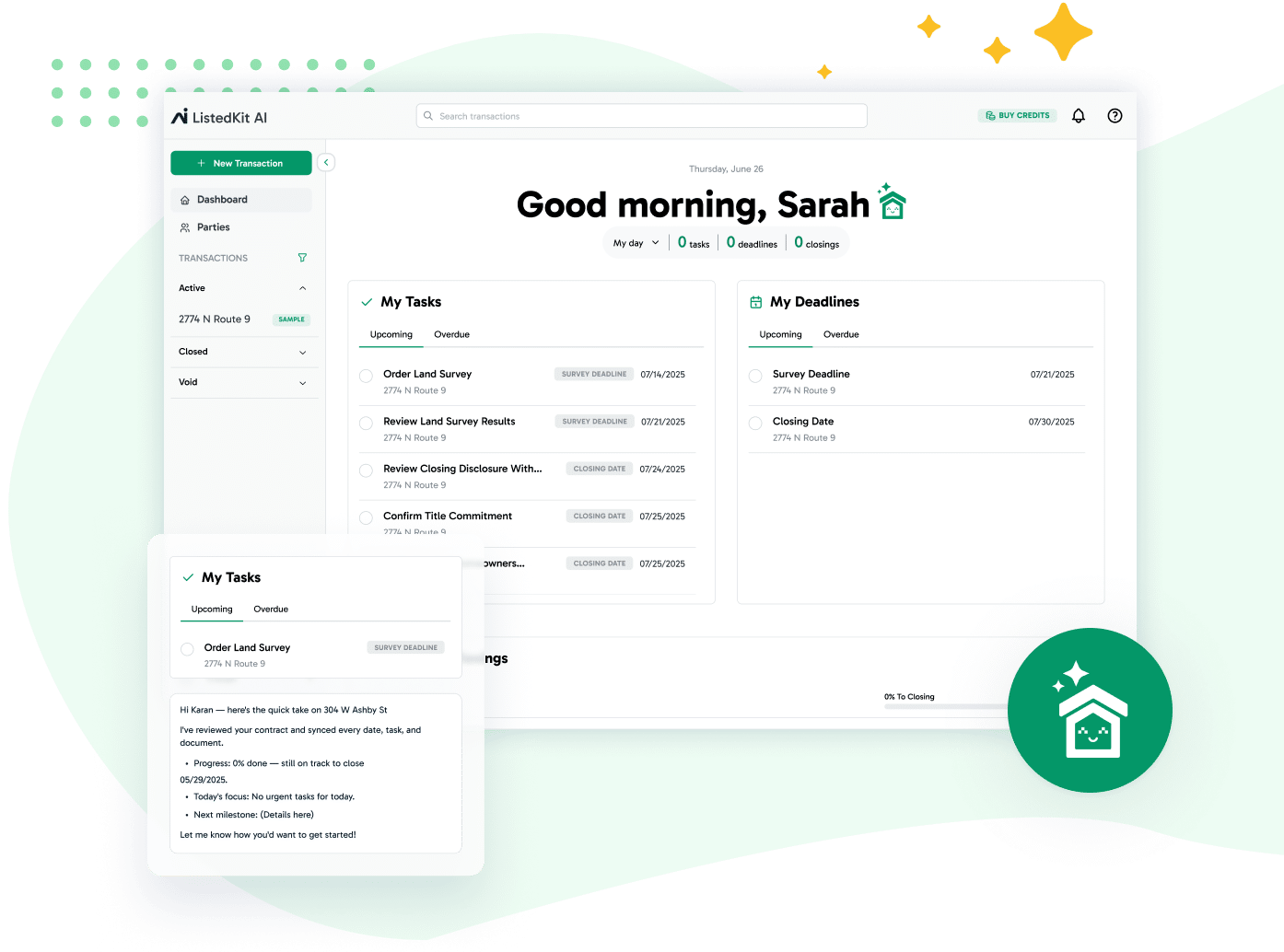Handling transaction files in the real estate business has always required precision and patience. However, as the real estate market changes and deal volume rises, many solo transaction coordinators (TCs) are under pressure to manage dozens—sometimes over 70—of real estate transactions at once.
If that sounds familiar, you’re not alone.
This guide outlines ten practical strategies designed to help solo real estate TCs operate with confidence, even when the workload feels intense.
These tips are built from real conversations, hands-on practices, and systems that work across high-volume real estate teams. Let’s break them down.
1. Use Task Batching to Protect Your Focus
Task batching is one of those small changes that can lead to big results, especially when managing multiple transactions at once.
We talked with Kristi Winfree, a seasoned coordinator. Her approach? Grouping similar real estate tasks together, like setting up new files, checking contract compliance, and scheduling them in blocks.
Here’s where batching helps:
- Reduces mental fatigue from constant switching
- Gives structure to chaotic workdays
- Creates flow so you can work more efficiently
Great Areas to Batch
- Initial file review and contract upload. Doing this all at once lets you catch missing documents or signature gaps early instead of discovering them days later. It also helps you mentally shift into setup mode to be consistent across every transaction.
- Weekly compliance checks. Reviewing all active files on a set day reduces the risk of last-minute surprises right before closing. It also makes it easier to spot patterns in what’s frequently missed so you can update your checklist accordingly.
- Calendar and deadline audits. Looking across your entire pipeline for upcoming dates lets you avoid potential delays. You’ll also feel less reactive because you’re not scrambling to catch due dates day by day.
- Follow-ups with lenders or buyer agents. Sending all follow-up messages at once improves efficiency and keeps communication aligned. Plus, you can track responses more easily when everything is grouped together.
- Scheduling inspections and walk-throughs. Coordinating these in a single block helps avoid overlap and missed appointments. Relaying availability to multiple parties is easier when you’re already in scheduling mode.
Creating a pattern and sticking with it allows you to maintain focus across multiple deals while saving time.
2. Choose the Right Transaction Management System
If you’re managing more than 50 deals at once, your software setup can either support you or slow you down.
There are many tools out there, but you need one that actually matches your real estate workflows. ListedKit is a great option for real estate TCs who want to reduce manual admin work without sacrificing control.
ListedKit includes:
- Custom checklists that adapt to different property types or locations
- Automated real estate email templates
- Cloud-based document storage and sharing
- Deadline reminders and task tracking
- Built-in compliance tracking for real estate legalities
You can try it for free, and once you’re ready to commit, it’s only $49/month.
INTRODUCING: AVA BY LISTEDKIT AI

Your intelligent AI assistant for real estate transactions. Created with one goal in mind: let AI do the grunt work so you can do the important work.
Pro tip: Don’t wait until you’re overwhelmed to find a solution. Investing in real estate transaction tools before your file count spikes will save you long-term headaches and reduce errors.
3. Set Up Smart Automations—but Keep a Human Eye on It
Automation can give you breathing room, but it still requires oversight.
When working across dozens of transactions, you can’t manually send every reminder, but you also don’t want to risk errors with sensitive messages.
What you can automate safely
- Task reminders for earnest money and home warranty coordination
- Real estate email signature templates for initial intros and closing updates
- Auto-reminders for document signatures
- Notifications for inspection dates, appraisal deadlines, and funding timelines
Where to keep manual control
- Emails that require negotiation or client reassurance
- Final confirmation messages for real estate closing
- Contractual updates or timeline changes
A quick double-check before sending time-sensitive or legal information can go a long way toward keeping your real estate clients happy and deals on track.
4. Build a Daily Routine That Actually Works
When every day brings a new set of emails, deadlines, and calls, routines can keep you grounded. Even a simple structure can help you stay ahead.
Try this sample schedule, then adjust it based on your deal volume:
Morning
- Prioritize urgent emails and new offers
- Check the calendar for today’s and tomorrow’s due dates
- Review the task list from your transaction software
Midday
- Process earnest money and option fee entries
- Follow up on any pending inspection reports or loan approvals
- Document upload and naming
Afternoon
- Update compliance tasks
- Review upcoming closings and real estate legalities
- Respond to agent check-ins or clarification requests

Daily Planner For TCs: Free Canva Template
This structure allows for adaptability without losing the bigger picture. Whether you’re managing deals across a single buyer or working with multi-state real estate coordination services, anchoring your day in routine helps keep priorities clear.
5. Prioritize What Moves the Needle
When your to-do list spans multiple tabs and timelines, it helps to be selective. Not everything has equal weight.
Start each day by focusing on:
- Calendar-based deadlines (earnest money, contingencies, walkthroughs)
- Actions that require outside parties (lenders, buyer agents, inspectors)
- Contract setup for new transactions
- Compliance checks for files closing in the next seven days
Think about high-leverage tasks—things that, when completed, push the entire transaction forward.
Staying proactive here often means fewer surprises later, fewer missed dates, and less cleanup during the closing process.
6. Time-Block with Flexibility
Real estate isn’t a 9-to-5 job. But you can still structure your week by grouping similar actions on the same day.
Try soft time-blocking:
- Mondays: Document review and real estate contract management updates
- Tuesdays: Lender follow-ups and timeline adjustments
- Wednesdays: Compliance review and brokerage file audit
- Thursdays: Listing process updates and client communication
- Fridays: Final checks for next week’s closings
Use Airtable, Trello, or your ListedKit dashboard to stay organized.
This structure prevents your days from blending together, which is especially helpful when you’re managing 50+ deals across residential real estate and investment properties.
7. Sharpen Your Communication Strategy
When you’re the only one managing files, communication becomes the glue. But writing the same email 12 times a day isn’t helping anyone.
Here’s how you can improve clarity and speed:
- Create a library of pre-written emails for updates, checklists, and reminders
- Use tools like Folio to group real estate email threads by transaction
- Set expectations for response time with agents and real estate clients
For urgent updates? Text works well—just make sure to document it somewhere.
Clear, repeatable communication helps minimize delays and supports a better client experience, especially during contract changes or high-pressure moments.
8. Build a Real Checklist for Compliance
You know the feeling—an urgent closing is hours away, and someone suddenly asks if the flood disclosure got signed. That’s where a solid compliance SOP and checklist matter.
Build one that includes:
- State-specific, regional, and local disclosures
- Brokerage document standards
- Lender-required attachments
- Property inspection and appraisal documents
Review this checklist weekly and make updates when rules or brokerage policies shift.
Bonus tip: You can automatically upload this into ListedKit and apply it to new files.
9. Clean Up Your Document Handling Process
Messy files cost time. Small mistakes—wrongly named files, outdated PDFs, missing initials—add up fast when you’re moving fast.
Here’s how to stay organized:
- Use consistent naming for every file: “123Main_LOE_Signed_2025.pdf”
- Store documents in folders grouped by transaction stage (Offer, Active, Closing)
- Use cloud storage or platforms that support file sharing with agents and clients
- Set auto-reminders for unsigned or missing items
If you’re feeling buried, AI tools can help with quick doc review or data entry.
Tip: Scan the documents for every new file immediately after receipt and upload them to one system—don’t spread files across email, Drive, Dropbox, and more. Stick to one. For instance, you can use and stick with Google Workspace.
10. Improve as You Go
Your workflow shouldn’t be static. With each new real estate closing, you get a chance to improve your systems.
Keep a short list of what didn’t work or took longer than it should’ve. Then, review it every month or two.
Try:
- Asking agents what they’d like improved (fewer emails, earlier reminders, etc.)
- Noting delays caused by your own bottlenecks (e.g., not having templates ready)
- Watching real estate trends around software, digital forms, or AI contract readers
- Attending webinars or meetups with other solo TCs or transaction teams
- Adjusting your checklist or software setup for next time
With each cycle, you’ll work faster, with fewer errors and less stress.
You Don’t Have to Do It All Manually—Build a System That Works for You
Managing dozens of transactions for your real estate business as a solo TC is about finding practical ways to stay organized without sacrificing service.
Here’s a quick recap of what can help:
- Group similar tasks to stay focused and consistent
- Use a transaction system that supports your daily process
- Automate the right things—but keep a personal touch where it matters
- Stick to a flexible daily and weekly routine
- Prioritize what moves deals forward
- Communicate clearly with reusable templates and tools
- Keep your compliance checklist sharp and updated
- Clean up your digital document flow
- Look for small ways to improve with every closing
If any of these areas feel out of reach right now, that’s exactly why we’re here.
Book a demo of ListedKit and see how better tools can support your systems—so you can keep doing great work, even when the workload gets heavy.




